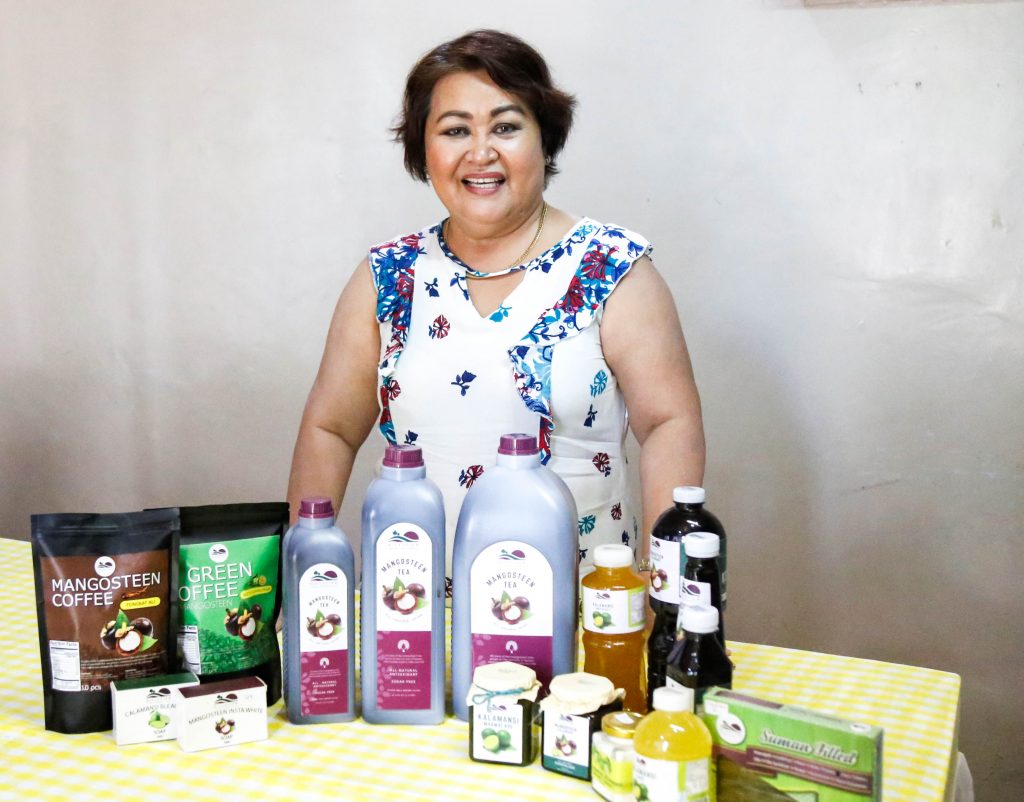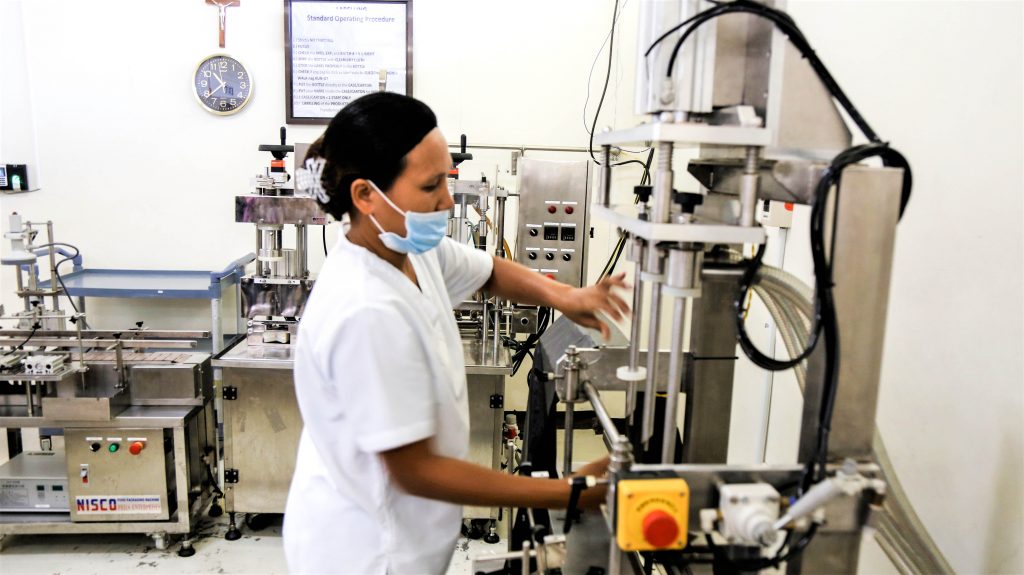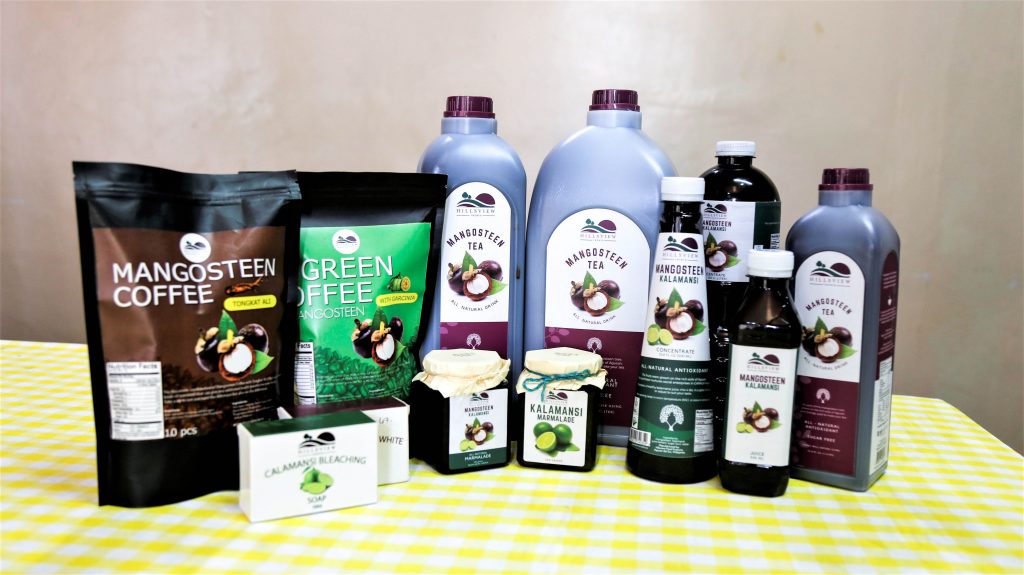Mangosteen Healthy Blend
“When life gives you lemons, make lemonade,” goes the old adage about hope in the face of adversity. Former Trento, Agusan del Sur Mayor Irenea Hitgano has embodied this phrase for positivity in both the metaphorical and literal sense–except that she trades lemons for mangosteen, and makes mangosteen tea instead of lemonade.
Blooming from the rubble—or rather, from 60 uprooted mangosteen trees in a farm ravaged by Typhoon Pablo in 2012—Irenea’s Jannicah Food Products has helped people not only through what is seemingly a “miracle beverage,” but also through various livelihood opportunities for the locals of Agusan del Sur.

Steeping a new beginning
It all began in the wake of a disaster.
“We were tending falcata trees in our farm as far back as 2006 or 2007,” narrated Irenea, referring to a pulp-and-paper species thriving in the timber-rich province. “A friend suggested we farm mangosteen instead, saying it will yield us Php 1M per hectare in eight to ten years. I thought, why not? Let’s try and see if it will work after a decade.”
Tree farming has been a known practice in the upland villages of Agusan del Sur. The region’s teeming wood and paper industry has made falcata trees a staple in the practice. While not exactly a risk, choosing to plant mangosteen trees had required lots of patience from Irenea before she could reap the promised rewards. Farm-to-table, Hitgano mused, it did sound a lot better than just farm-to-paper mill.
However, it turned out that the odds were not in her favor: disaster struck two years before potential harvest season.
Irenea was initially disheartened to find felled trees in the 20-hectare farm behind the Hillsview Trento restaurant and inn that she runs. The ever-optimistic owner, remembering tips from a friend about the mangosteen trees’ medicinal properties from leaves to roots, decided to retrieve the remaining parts and concocted something they can offer to their customers.
“We chopped the roots, barks, and branches into tiny pieces, boiled them, and served the tea for free in our restaurant,” shared Irenea. People were quick to patronize the drink; up to this day, travelers stopping by at Hillsview can be seen helping themselves to mugs of the now famed mangosteen tea as they snack on other homegrown delicacies being sold in the place.
Billed as the “Queen of Tropical Fruits,” mangosteen contains antioxidant-rich organic compounds called xanthones. Studies show that high concentrations of xanthones in the hull or the fruit’s outer skin are replete with anti-inflammatory, antimicrobial, and anti-fungal properties, among others.
It was not long before anecdotal accounts of what seemed to be medicinal miracles of the mangosteen tea found their way back to Irenea.
“Someone approached me and said he found traces of blood in his urine two days after drinking the tea. He was told that it could be our mangosteen tea flushing out toxins from his body,” said Irenea of a customer who purchased a pack of Php 50.00 worth of chopped twigs from her.
She said several customers also shared their own positive experience after sipping cups of mangosteen tea.
These testimonials and many patrons’ clamor for a ready-made concoction inspired Irenea to push for the improvement of her product. Aware that her knowledge in the production and manufacturing of such products is limited, she sought the assistance of various government agencies, particularly of the Department of Trade and Industry (DTI) and the Department of Science and Technology (DOST).

From a tiny casserole to a booming enterprise
“We started brewing our tea in a small casserole,” reminisced Irenea. “The casserole kept getting bigger when we get more and more customers, thanks to the guidance provided by the DTI. Giving us a chance to showcase our products in trade fairs has proved to be a big help.”
Jannicah Food Products earned about Php 6,000 to Php 8,000 in the first trade fair they became a part of, but Irenea stressed it was more than enough to spread the word about their health drink. The product’s medicinal qualities traveled by mouth, bearing sterling reviews and narratives about the product’s myriad of healing benefits.
After some time, they could no longer keep up with the demand. Hand-stirring and tiny cook wares could no longer produce the required volume.
Irenea then applied for a Php 4.4M loan at DOST. The amount helped her build a factory and acquire the needed machinery that would later streamline the process of mangosteen tea production.
Although properly equipped, she confessed that their endeavor’s progress was not exactly smooth sailing. Commendations can do only so far when the drink comes in bottles fit only for condiments. The owner knew she could sell more by “dressing it well.”
This is where DTI stepped in again.
“Apart from the slots we’re given in trade shows, DTI’s labeling and packaging services have played a significant role in our growth as a business,” Irenea shared. “They let a personal consultant guide us. We would go on ‘Lakbay Aral’ tours to learn about appropriate containers for the tea. They also offered the labels for free.”
While pure tea remains Jannicah Food Products’ star beverage, they have begun expanding their offerings with the implementation of their branding and marketing strategies Their mangosteen’s curative goodness now comes in coffee, powder, juice, and concentrate forms.

Branching out
Jannicah Food Products’ mangosteen tea is more than just a wonder drink. Little miracles, in the form of livelihood and chances of alternative education, were also bestowed to people who happened to work directly and indirectly for the enterprise.
For instance, the enterprise sources calamansi from small farmers in the province for their mangosteen-calamansi concentrate variant.
“Calamansi abounds [in Trento] to a point that one full sack costs only Php 50 to Php 100,” shared Irenea. “Oversupply seems to be a norm. I thought it’s a big waste if the farmers will just throw the fruits away, so I buy from them to make the concentrate. We ventured into making calamansi marmalade, too, to make sure we get to use even the peel.”
A few companies briefly established collaborations with Irenea’s stores as well. One in particular manufactures a mangosteen-turmeric product, and it is the Hillsview Trento farms that sourced the fruits.
Irenea also takes good care of her own employees. Aside from making sure they are well-compensated, she gives them chances to open new opportunities through education. Farmers and factory workers, specifically those who are “no read, no write” or did not finish high school, are encouraged to attend seminars monthly as part of their alternative learning. Employees pursuing masteral studies are allowed to take flexible work schedule.
“My employees are not just here to work. I also want them improve their lives,” said Irenea.
Tracing the next steps
At present, Jannicah Food Products has established stores and kiosks in various malls nationwide. People flock at their booths in trade fairs, both here or abroad. Irenea revealed plans to expand the area of the mangosteen farms to increase their exports. In fact, they recently sent a representative to South Korea to provide samples to prospective exporters. The future, indeed, looks bright for the business.
“We wouldn’t be here if it weren’t for the government,” Irenea concluded. “We couldn’t have done this all on our own. That’s why we are grateful for all the help of DTI.”



